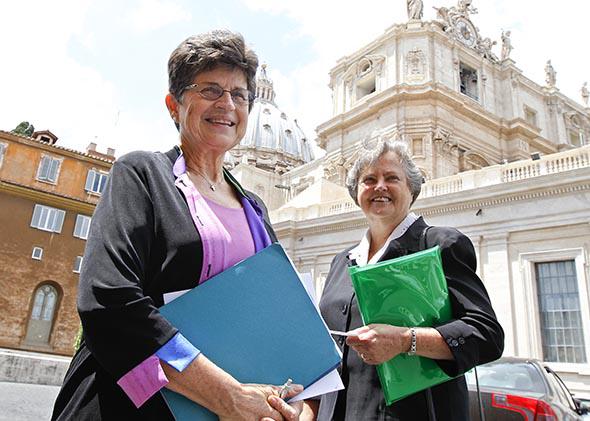At the end of last year, the Vatican ended its controversial six-year investigation into the lives and actions of American nuns with an approving report. The entire exercise was a strange waste of time that rightfully angered many Catholics: Though the report scrutinized the nuns for their commitment to social justice—referred to as their “feminist spirit” and “secular mentality”—it concluded by essentially telling them to keep doing what they’re doing to work toward “the elimination of the structural causes of poverty.”
That wasn’t the church’s only pointless nun investigation. Even after Pope Francis’ call “to create still broader opportunities for a more incisive female presence in the church,” the Vatican was still in the midst of another nun review. This one focused on the Leadership Conference of Women Religious, an umbrella group representing about 80 percent of American nuns, who were accused of indulging in “radical feminist themes” and therefore straying from Catholic doctrine.
The timeline for the review was always murky, but on Thursday morning, the Vatican abruptly announced an end to that investigation as well. Cardinal Gerhard Mueller, head of the Congregation for the Doctrine of the Faith and leader of this effort, did little in the way of explanation—the official joint statement speaks in the abstract, mentioning “fruitful conversation” and “substantive dialogue,” with few, if any, details. As the Jesuit priest and Slate contributor James Martin posted on Facebook:
In a press release and statement the LCWR agreed to implement some changes, mainly regarding speakers and liturgies at its annual conventions. But overall, the operations of the LCWR remains intact. Early fears of the outright elimination of the group, a wholesale Vatican takeover or a complete reordering of their statutes have proven unfounded.
In the end, this confusing outcome can only be seen as a victory and vindication for the LCWR. Charged in 2012 of straying from the church’s doctrine for focusing on social-justice issues, they were subjected to the Vatican’s surprise assessment, with what seemed like plans to take over the group and refocus it. The Vatican wanted the nuns to pay more attention to the church’s stance on sexuality and abortion and not promote health care reform in the U.S. Unsurprisingly, the sisters were outraged, and many Catholics supported them in this anger.
It’s encouraging that the Vatican is trying to move forward from these pointless exercises. But as I said in my post at the conclusion of the first investigation last year, the Catholic Church needs to do more than find a way to “broaden” female participation, as Pope Francis suggested in December—it also needs to figure out how to retain nuns. There only about 50,000 nuns in the U.S., and the median age for nuns is now in the late 70s. This dwindling, aging workforce is typically underpaid for their work running Catholic hospitals and schools. Now that the church is no longer investigating these women, it should use its free time to find ways to help them.
Correction, April 17, 2015: This post originally included a photo of nuns from Sister of Life, which is not part of the Leadership Conference of Women Religious community. The photo has been changed.
